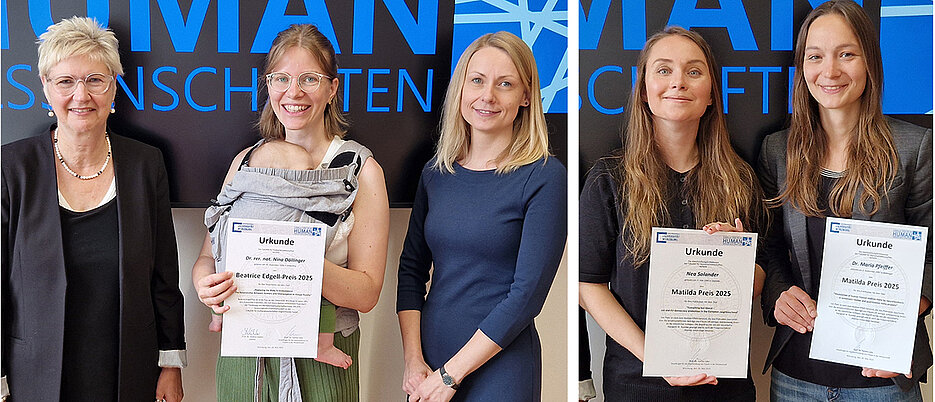Prizes for Three Young Female Researchers
10/14/2025The Faculty of Human Sciences has awarded Dr Nina Döllinger the Beatrice Edgell Prize for her dissertation. The Matilda Prize for the best papers went to Dr Maria Pfeiffer and Nea Solander.

The Faculty of Human Sciences awards the Beatrice Edgell Prize, worth 1,000 euros, to outstanding doctoral theses by women. For 2025, it goes to Dr Nina Döllinger from the Institute Human-Computer-Media.
In her dissertation, Nina Döllinger investigated how the perception of one's own body changes when people use an avatar in virtual reality (VR). She developed a model for self-perception and avatar perception, analysed existing studies and conducted her own experiments. Her research shows how VR can influence physical and mental self-perception - with potential applications in therapy, for example for eating disorders. Her work has resulted in seven scientific publications. In addition to her doctorate, Nina Döllinger has been involved in teaching, science communication and academic self-administration. She is currently planning a habilitation project.
The prize is named after the British scientist Beatrice Edgell. She was the first woman to be awarded a doctorate at the University of Würzburg in 1901. Further information on the Beatrice Edgell Prize.
Matilda Prize for Maria Pfeiffer and Nea Solander
The faculty also awards the Matilda Prize for the two best papers by young female researchers. Each prize is endowed with 1,000 euros.
The name of the prize is derived from the Matilda effect. This describes the phenomenon that scientific contributions by women are often less recognised than those by men. The phenomenon is named after the women's rights activist Matilda Joslyn Gage. Further information about the Matilda Prize.
Dr Maria Pfeiffer from the Institute of Psychology receives the prize for her scientific work on brain research. She has investigated how people can learn to specifically influence their brain activity through so-called neurofeedback. This is achieved via a specific brain frequency that is linked to attention and concentration. The study summarises previous investigations and evaluates their results. On this basis, Dr Pfeiffer proposes new studies. She also developed a standardised language to describe the effect of neurofeedback more clearly. Her work helps to better compare research results and design new studies in a more targeted way.
Nea Solander from the Chair of International Relations and European Studies is honoured for an article on the EU's promotion of democracy. In it, she examines how the EU supports democracy in its neighbourhood and which areas it particularly influences. Her study shows that although the EU does not always promote traditional democracies, it does specifically strengthen the rule of law or fair elections. Nea Solander thus provides new insights into how the EU acts as a global player and why its strategies are successful in certain areas. The work contributes to the academic debate on the role of the EU in the world.








